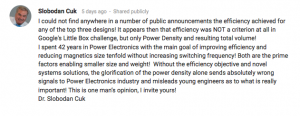A couple of years ago Google announced an electrical engineering contest with a $1M prize. The goal was build the most compact DC to AC power inverter that could meet certain requirements, namely 2kVA power output at 240 Vac 60Hz, from a 450V DC source with a 10Ω impedance. The inverter had to withstand certain ambient conditions and reliability, and it had to meet FCC interference requirements.
Fast forward a few years, and the results are in. Several finalists met the design criteria, and the grand prize winner exceeded the energy density requirements by more than 3x!
First, Congrats, to the “Red Electrical Devils!”  I wish I were smart enough to have been able to participate, but my knowledge of power electronics is pretty hands-off, unless you are impressed by using TRIACs to control holiday lighting. Here’s the IEEE on what they thought it would take to win.
I wish I were smart enough to have been able to participate, but my knowledge of power electronics is pretty hands-off, unless you are impressed by using TRIACs to control holiday lighting. Here’s the IEEE on what they thought it would take to win.
Aside from general gEEkiness, two things interested me about this contest. First, from an econ perspective, contests are just a fascinating way to spur R&D. Would you be able to get entrants, given the cost of participation and the likelihood of winning the grand prize? Answer: yes. This seems to be a reliable outcome if the goal is interested enough to the right body of would-be participants.
The second thing that I found fascinating was the goal: power density. I think most people understand the goals of efficiency, but is it important that power inverters be small? The PV inverter on the side of your house, also probably around 2kW, is maybe 20x as big as these. Is that bad? How much is it worth it to shrink such an inverter? (Now, it is true if you want to achieve power density, you must push on efficiency quite a bit, as every watt of energy lost to heat needs to be dissipated somehow, and that gets harder and harder as the device gets smaller. But in this case, though efficiencies achieved were excellent, they were not cutting edge, and the teams instead pursued extremely clever cooling approaches.)
I wonder what target market Google has in mind for these high power density inverters. Cars perhaps? In that case, density is more important than a fixed PV inverter, but still seemingly not critical to this extreme. Specific density rather than volumetric seems like it would be more important. Maybe Google never had a target in mind. For sure, there was no big reveal with the winner announcement. Maybe Google just thought that this goal was the most likely to generate innovation in this space overall, without a particular end use in mind at all — it’s certainly true that power electronics are a huge enabling piece of our renewable energy future, and perhaps it’s not getting the share of attention it deserves.
I’m not the first, though, to wonder what this contest was “really about.” I did not have to scroll far down the comments to see one from Slobodon Ćuk, a rather famous power electronics researcher, inventor of a the Ćuk inverter.
 Anyway, an interesting mini-mystery, but a cool achievement regardless.
Anyway, an interesting mini-mystery, but a cool achievement regardless.